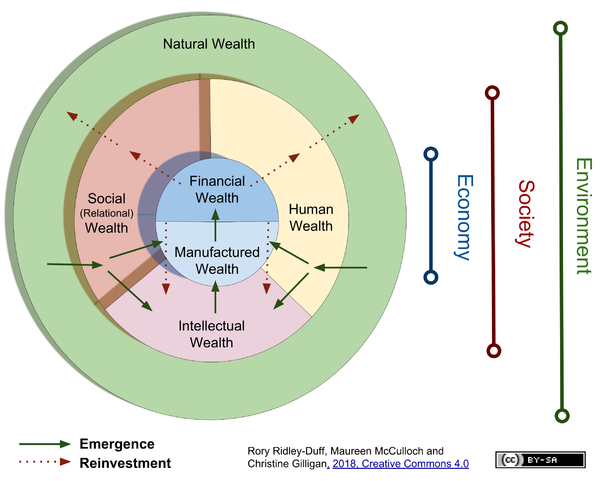Difference between revisions of "Social Capital"
Jeffsuccess (Talk | contribs) m |
|||
| (2 intermediate revisions by one user not shown) | |||
| Line 1: | Line 1: | ||
| − | Social capital is | + | For FairShares V3.0a, 'Social capital' is renamed 'Social wealth'. |
| + | |||
| + | Social wealth (sometimes referred to as ‘social capital’) is linked to social networks, particularly those where members have a sufficient level of trust for network members to communicate effectively and provide each other with valuable resources. A person who has social wealth has access to a social network that enables them to find out information and access resources. Social wealth (capital) is also theorised in terms of the trust generated by relationships. A trusted person has more social wealth than someone who is not trusted because the trusted person will not only feel better in themselves, but also find it easier to access resources within their social networks. For example, if an enterprise does not have good relationships with trade unions (or trade union members), customers and an investment community, it will have less social wealth than those with good labour, customer and (public, social or private) investor support. When considering social wealth, think about the size and quality of the social networks created (or harmed) by enterprise/project activities. Social wealth comes in the form of networks of people in high trust relationships. | ||
Latest revision as of 11:52, 27 November 2019
For FairShares V3.0a, 'Social capital' is renamed 'Social wealth'.
Social wealth (sometimes referred to as ‘social capital’) is linked to social networks, particularly those where members have a sufficient level of trust for network members to communicate effectively and provide each other with valuable resources. A person who has social wealth has access to a social network that enables them to find out information and access resources. Social wealth (capital) is also theorised in terms of the trust generated by relationships. A trusted person has more social wealth than someone who is not trusted because the trusted person will not only feel better in themselves, but also find it easier to access resources within their social networks. For example, if an enterprise does not have good relationships with trade unions (or trade union members), customers and an investment community, it will have less social wealth than those with good labour, customer and (public, social or private) investor support. When considering social wealth, think about the size and quality of the social networks created (or harmed) by enterprise/project activities. Social wealth comes in the form of networks of people in high trust relationships.
Return to Capital
